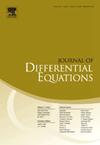The non-homogeneous Dirichlet problem for the p(x)-Laplacian with unbounded p(x) on a smooth domain
IF 2.4
2区 数学
Q1 MATHEMATICS
引用次数: 0
Abstract
This paper examines the solvability of the Dirichlet problem for the variable exponent p-Laplacian in the case of unbounded . For a bounded domain with a smooth boundary and p satisfying and φ in the Sobolev space , we investigate the problem We introduce the space , which is the natural solution space for the minimization of the Dirichlet integral given the unbounded nature of . Our main results establish the existence and uniqueness of solutions within this space. Since is not defined via a TVS topology, the paper includes the description of the necessary modular topological framework and discusses Clarkson-type inequalities for unbounded variable exponents, which are interesting in their own right.
求助全文
约1分钟内获得全文
求助全文
来源期刊
CiteScore
4.40
自引率
8.30%
发文量
543
审稿时长
9 months
期刊介绍:
The Journal of Differential Equations is concerned with the theory and the application of differential equations. The articles published are addressed not only to mathematicians but also to those engineers, physicists, and other scientists for whom differential equations are valuable research tools.
Research Areas Include:
• Mathematical control theory
• Ordinary differential equations
• Partial differential equations
• Stochastic differential equations
• Topological dynamics
• Related topics

 求助内容:
求助内容: 应助结果提醒方式:
应助结果提醒方式:


